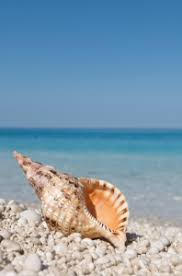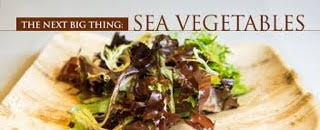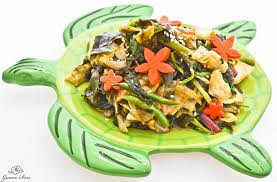 Want to know what’s the next great thing in the world of Nutrition? Sea Vegetables. Sea vegetables are plants from the sea. They not only carry an amazing array of nutrients, but they’re also energetically charged, taste amazing, and come in many different forms. Most sea vegetables contain a similar array of nutrients, including iodine, vitamins C and B12, protein, iron, zinc, and many more. Many of them require rehydration before eating.
Want to know what’s the next great thing in the world of Nutrition? Sea Vegetables. Sea vegetables are plants from the sea. They not only carry an amazing array of nutrients, but they’re also energetically charged, taste amazing, and come in many different forms. Most sea vegetables contain a similar array of nutrients, including iodine, vitamins C and B12, protein, iron, zinc, and many more. Many of them require rehydration before eating.
- Agar: Clear, colorless, tasteless, and often used as a natural thickening agent, it’s best used to gelatinize foods such as pies, tarts, and puddings. Agar doesn’t really have any nutritional value, but it’s good for digestion because it’s high in fiber.
- Arame: This sea veggie is loaded with calcium and other minerals, such as magnesium, iron, and iodine. It’s subtle, soft, and stringy, and it makes a wonderful condiment for soups, salads, stir-fries, sandwiches, and wraps.
- Bladderwrack: This one is packed with vitamin K and mostly used medicinally as an excellent adrenal stimulant. It’s commonly used by Native Americans in steam baths for arthritis, gout, and illness recovery.

- Dulse: Sprinkling this red/purple seaweed in your soups and salad dressings is an easy way to add vitamins and minerals to your meals. It’s also the key “fishy” ingredient in mock tuna salads and Caesar dressings.
- Irish moss: This sea veggie is full of electrolyte minerals, such as calcium, magnesium, sodium, and potassium. Its mucilaginous compounds help you detoxify; boost your metabolism; and strengthen your hair, skin, and nails. It’s also traditionally used to treat low sex drive. In non-dairy cream and smoothies, it acts as a thickener.
- Kelp: This brown marine plant contains vitamins A, B, D, E, and K; is a main source of vitamin C; and is rich in minerals. Kelp proteins are comparable in quality to animal proteins. Kelp contains sodium alginate (algin), an element that helps remove radioactive particles and heavy metals from the body. Keep a container of kelp flakes on the table mixed with garlic powder and sesame seeds to add extra nutrition as well as seasoning to your food. Eating too much kelp can cause iodine overload and thyroid dysfunction, so proceed with caution.
- Kombu: All you need is a one-inch piece of kombu to put into your soup stock or beans. Kombu adds minerals and natural salt and helps prevent gas and bloating.

- Kuzu: A root starch that is similar to agar, this sea veggie is often used as a natural thickening agent. It can be used in custards, pie fillings, puddings, and sauces. It’s the perfect alternative to cornstarch. Kuzu is extremely medicinal and has been used to sooth digestion because of its fiber content.
- Laver: With less sodium than many other sea vegetables, laver is a good source of iodine, as well as iron and vitamin B12. It has a tangy, salty taste but develops more of a nutty taste when cooked in liquid.
It comes in flakes that are usually purplish. When hydrated, the flakes can hold about four times their dry weight. Most often, laver flakes are used in stir-fries, seafood chowders, and dips. They can also be used in salads or salad dressings for flavor.
- Nori: This is one of the most widely known sea vegetables. Most people have it in sushi, but it can also be eaten as a snack or added to miso soup. Nori contains vitamins A, B, C, and E and has chlorophyll and a wide spectrum of minerals.
- Sea palm: American arame grows only on the Pacific coast of North America. It has a sweet, salty taste that goes especially well as a vegetable, rice, or salad topping.
- Wakame: Full of magnesium, iodine, calcium, and iron, wakame has a subtly sweet flavor and is often used in soups and salads.

